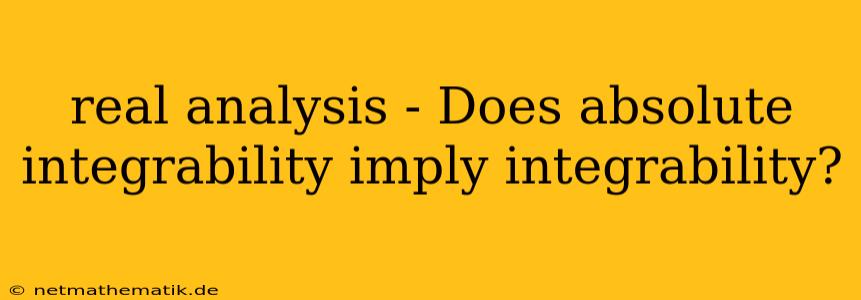In the realm of real analysis, the concept of integrability plays a pivotal role in understanding the behavior of functions and their properties. A function is considered integrable if its integral exists and is finite. However, a closely related concept is absolute integrability, where we consider the integral of the absolute value of the function. A natural question arises: Does absolute integrability imply integrability? This question delves into the relationship between these two concepts and explores the conditions under which one implies the other.
The Relationship Between Absolute Integrability and Integrability
At first glance, it might seem intuitive that if a function is absolutely integrable, then it must also be integrable. After all, the integral of the absolute value is a measure of the total area under the curve, regardless of whether the function is positive or negative. However, this intuition is not always accurate. While absolute integrability often implies integrability, there are certain conditions that must be met.
Understanding the Concepts
Let's define these concepts more formally:
-
Integrability: A function f(x) is said to be integrable on an interval [a, b] if its definite integral exists and is finite:
∫[a, b] f(x) dx < ∞ -
Absolute Integrability: A function f(x) is said to be absolutely integrable on an interval [a, b] if its integral of the absolute value exists and is finite:
∫[a, b] |f(x)| dx < ∞
The Implication: When Absolute Integrability Guarantees Integrability
The key to understanding the relationship between absolute integrability and integrability lies in the triangle inequality for integrals. This inequality states that for any integrable functions f(x) and g(x):
∫[a, b] |f(x) + g(x)| dx ≤ ∫[a, b] |f(x)| dx + ∫[a, b] |g(x)| dx
Now, consider a function f(x) that is absolutely integrable on [a, b]. We can decompose f(x) into its positive and negative parts:
f(x) = f+(x) - f-(x)
where f+(x) = max(f(x), 0) and f-(x) = max(-f(x), 0).
Since f(x) is absolutely integrable, both f+(x) and f-(x) are also absolutely integrable. Applying the triangle inequality, we get:
∫[a, b] |f(x)| dx = ∫[a, b] |f+(x) - f-(x)| dx ≤ ∫[a, b] |f+(x)| dx + ∫[a, b] |f-(x)| dx
Since f+(x) and f-(x) are non-negative, their integrals are equal to their absolute values. Therefore, we have:
∫[a, b] |f(x)| dx ≤ ∫[a, b] f+(x) dx + ∫[a, b] f-(x) dx
This inequality shows that if f(x) is absolutely integrable, then both its positive and negative parts are also integrable. Consequently, f(x) itself must be integrable because it is the difference of two integrable functions.
In essence, absolute integrability ensures that the integral of the function does not diverge due to oscillations or unbounded behavior. It provides a bound on the total area under the curve, guaranteeing the existence of a finite integral.
When Absolute Integrability Does Not Imply Integrability
While absolute integrability often implies integrability, there are situations where this is not the case. This arises when the function exhibits unbounded behavior or oscillations that prevent the integral from converging.
Consider the following example:
f(x) = 1/x for x ∈ (0, 1]
This function is not integrable on (0, 1] because its integral diverges:
∫(0, 1] 1/x dx = lim┬(ε→0⁺)〖∫(ε, 1] 1/x dx 〗 = lim┬(ε→0⁺)〖〖ln(1) - ln(ε) 〗 = ∞
However, the function is absolutely integrable:
∫(0, 1] |1/x| dx = ∫(0, 1] 1/x dx = ∞
In this case, the integral of the absolute value diverges to infinity, but the integral of the function itself also diverges to infinity. Therefore, even though the function is absolutely integrable, it is not integrable.
This example illustrates that absolute integrability alone is not sufficient to guarantee integrability. We need additional conditions to ensure convergence of the integral.
Key Conditions for Absolute Integrability Implying Integrability
Here are some key conditions that guarantee integrability when a function is absolutely integrable:
- Boundedness: If f(x) is absolutely integrable and bounded on [a, b], then it is integrable.
- Continuity: If f(x) is absolutely integrable and continuous on [a, b], then it is integrable.
- Piecewise Continuity: If f(x) is absolutely integrable and piecewise continuous on [a, b], then it is integrable.
- Monotonicity: If f(x) is absolutely integrable and monotone on [a, b], then it is integrable.
These conditions essentially restrict the behavior of the function, preventing unboundedness or excessive oscillations that could lead to divergence.
Conclusion
The relationship between absolute integrability and integrability is complex and nuanced. While absolute integrability often implies integrability, it is not always the case. Certain conditions, such as boundedness or continuity, are necessary to guarantee integrability. Understanding the relationship between these concepts is crucial for studying real analysis and applications involving integrals. By recognizing the limitations and strengths of each concept, we can effectively analyze and understand the behavior of functions and their integrals.
